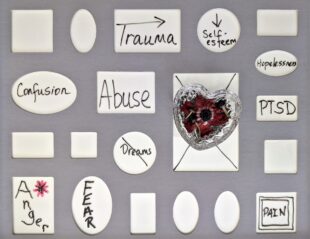Cognitive Processing Therapy and PTSD
John Lakvold
Approximately sixty percent of men and fifty percent of women will experience a traumatic event in their lifetimes (VA, n.d.). Direct traumatic events occur when an individual survives a natural disaster, directly experiences a physical and/or sexual assault, or becomes involved in some form of transportation-related accident.
Individuals can also experience a traumatic event indirectly if they witnessed a traumatic event happening to another individual, or they learned about the event from a close friend or relative. In the course of their duties, first responders face frequent exposure to the unintended and unpleasant details of tragic events, such as blood, dead bodies, family members crying, and notifying victim’s families.
 Fortunately, only thirty percent of individuals who experience a traumatic event later develop Post Traumatic Stress Disorder (“PTSD,” Chard, 2023). Those who do not develop PTSD learn to accommodate the trauma and build resiliency.
Fortunately, only thirty percent of individuals who experience a traumatic event later develop Post Traumatic Stress Disorder (“PTSD,” Chard, 2023). Those who do not develop PTSD learn to accommodate the trauma and build resiliency.Individuals with PTSD are plagued by intrusive thoughts and memories, avoidance of internal and external reminders of the trauma event, negative alterations in cognitions and mood, and marked reactivity and hyperarousal lasting longer than a month. These symptoms cause significant distress to the individual or cause impairment of the individual’s social, occupational, and other areas of functioning.
Top-down versus Bottom-Up Approaches
Most clinicians use a top-down approach and/or a bottom-up approach to treat PTSD. The top-down approach involves helping the client to increase their prefrontal cortex activity and decrease amygdala hijacking of the brain. The bottom-up approach involves the clinician helping the client to calm the body’s reaction to post-traumatic stress that is causing a ripple effect in the client’s brain activity.
Top-down approaches have been studied more frequently, have more randomized clinical trials, and have more acceptance from governmental agencies. Bottom-up approaches are more experimental and require more studies to prove their efficacies.
Two top-down approaches to treating PTSD and one bottom-up approach for adults have received the most research and received recognition for their effectiveness. The top-down approaches are Prolonged Exposure (“PE”) developed by Edna Foa and Cognitive Processing Therapy (“CPT”) developed originally by Patricia Resnick and further enhanced by Kathleen Chard and Candice Monson.
The only bottom-up approach is Eye Movement Desensitizing and Reprocessing (“EMDR”) developed by Francine Shapiro. For this article, this writer will focus only on Cognitive Processing Therapy.
Cognitive Processing Therapy
Cognitive Processing Therapy (“CPT”) is a short-term, evidence-based treatment for PTSD. The sessions are usually between 8-15 sessions in duration. It follows a specific protocol. CPT is a form of cognitive-behavioral behavior with a predominantly cognitive-focused approach. CPT allows the clients to choose whether they will complete a written account of their trauma. Clinicians can use CPT individually and/or in groups.
CPT requires clients to be committed to attending sessions and completing their practice assignments. The closer the appointments are scheduled together, the better the outcome will be (Chard). For example, a journalist completed ten CPT sessions in two weeks to overcome a sexual assault (Lowe, 2019).
Because each session builds on the previous session, it is important to complete practice assignments on time. The more homework assignments completed, the greater improvement in PTSD symptoms occurs (Chard, 2023).
The gains made during CPT treatment last five years or more. Chard points out that CPT is more effective than PE in reducing secondary issues of guilt, reported health conditions, anger, hopelessness, and suicidal ideation. In addition, clients of CPT can see declines in depression and IPV revictimization and gains in social and work functioning.
CPT can be used via telehealth and in-person (Resnick, Monson, & Chard, 2024; Chard, 2023). Chard (2023) states that telehealth can reduce the drop-out rate, because individuals do not have to travel to the office, and clients may feel safer in their homes.
CPT can be modified for individuals with TBI and individuals with limited education (Resnick, Monson, & Chard, 2024). Individuals without a high school education in the Democratic Republic of Congo successfully administered CPT to trauma survivors of an ongoing war there effectively (Bass et al. NEJM, 2013, as cited in Chard, 2023).
The key to effective CPT treatment is to reduce the avoidance of internal and external reminders of the trauma. People do various things to avoid traumatic situations. Some people may overconsume legal and illicit substances to drown out negative emotions. Others may sidestep persons, places, and things to avoid dealing with traumatic situations.
As described above, top-down approaches, like CPT, bring the prefrontal cortex back online and prevent the amygdala from hijacking the brain. Whenever the amygdala overreacts, it sends a message to the brain stem to fight, flee, or freeze.
In an individual without PTSD, the prefrontal cortex would send a message back to the amygdala that it has the situation under control. However, in an individual with PTSD where the prefrontal cortex is underdeveloped, the amygdala continues to send inaccurate messages of danger.
 There are only four contraindications for CPT: active suicidality with the immediacy of acting on his or her plan with intent to die, individuals with unmedicated thought disorders (i.e. active mania or schizophrenia), individuals taking benzodiazepines, and individuals who are intoxicated or under the influence of a substance during the session.
There are only four contraindications for CPT: active suicidality with the immediacy of acting on his or her plan with intent to die, individuals with unmedicated thought disorders (i.e. active mania or schizophrenia), individuals taking benzodiazepines, and individuals who are intoxicated or under the influence of a substance during the session.
Concerning suicidality, an individual’s safety comes first. Unmedicated individuals with thought disorders are unable to participate in CPT due to delusional, hallucinatory, or manic-driven thinking. Individuals on benzodiazepines are not recommended for CPT treatment, because these medications block the prefrontal cortex from reactivating. Individuals under the influence of a substance are asked not to use it before or directly after a session or a practice assignment.
Important Concepts in CPT
Some important concepts found in CPT are stuck points, Impact Statements, ABC Worksheets, Exploring Questions Worksheets, Thought Patterns, and Alternative Thought Worksheets and themes. Stuck points are defined as “any thought that leads to a painful emotion that does dissipate readily on its own” (Chard, 2023).
Stuck points come in two varieties: assimilation and overaccommodation. Assimilation is a stuck point about the past or the trauma itself. Often, individuals who assimilate stuck points tell themselves, “If only I did this” or “I should have done X, then my trauma would not have occurred.”
In contrast, overaccommodation contains stuck points about the present and the future. Individuals with overaccommodated beliefs tend to overgeneralize with words like, “Because of my trauma, I can never trust men again,” “Because of my trauma, the streets will always be dangerous,” or “Because of my trauma, no one will love me after I experienced.” Stuck points are collected on the stuck point log during each session by the therapist and client.
CPT clinicians assign the impact statement after the first session. The purpose of the impact statement is to allow the client to state why he or she thinks that the traumatic event occurred. The clinician does not need to know the specific details about the trauma itself. According to Chard (2023), it is possible for a clinician not to know any details of the trauma.
The client will examine how the traumatic event has affected his or her beliefs about him or herself, others, and the world in the areas of safety, trust, power/control, esteem, and intimacy. A CPT clinician begins to look for stuck points in the second session while the client reads his or her impact statement.
In the twelfth session, the client and the CPT clinician will compare the old and the new impact statements assigned in the eleventh session. The goal of the impact statement and CPT overall is to reduce the stuck points.
CPT clinicians give clients ABC Worksheets after the second and third sessions. ABC worksheets allow clients to identify an activating event, beliefs (stuck points), and consequences of a feeling from those beliefs. Second, ABC Worksheets ask clients whether this belief is helpful and realistic. Third, ABC Worksheets also ask clients to consider potential alternative interpretations of the traumatic event.
The Exploring Questions worksheet, assigned after the fourth session, requires clients to challenge their stuck points by exploring the evidence against their stuck points and other pieces of evidence to dispute their stuck points. The Thought Patterns worksheet, assigned after the fifth session, requires clients to determine whether their thoughts are adaptive and useful to them.
Once clients complete their thought patterns, the Alternative Thoughts Worksheets incorporate all the previously mentioned worksheets to address trauma themes of safety, trust, power/control, esteem, and intimacy in the last five sessions.
Next Steps
PTSD is a mental health condition that can be resolved with the right treatment. As Chard argued above, clients have the freedom to choose which treatment fits their needs and is effective in reducing their PTSD symptoms.
At Spokane Christian Counseling, we have a variety of clinicians who take different approaches to trauma and PTSD. CPT is just one of the available approaches that is evidence-based and well-researched to resolve PTSD symptoms. Please reach out to us to assist you with your needs.
References:
Chard, K. (2023 May 30). Cognitive Processing Therapy (CPT) Mastery Course: A Session-By-Session Instructional Training For Treating PTSD And Trauma (Online Course). PESI, Inc.
Lowe, J. (2019 August 23). “Ten sessions”, This American Life.
Resnick, P. A., Monson, C. M., & Chard, K. M. (2024). Cognitive Processing Therapy For PTSD: A Comprehensive Therapist Manual (2d ed.). Guilford Press.
United States Department of Veterans Affairs (n.d.). “How Common is PTSD in adults?” Retrieved from How Common is PTSD in Adults? – PTSD: National Center for PTSD
Photos:
“Trauma”, Courtesy of Susan Wilkinson, Unsplash.com, CC0 License;
“Window”, Courtesy of Eric BARBEAU, Unsplash.com, CC0 License







